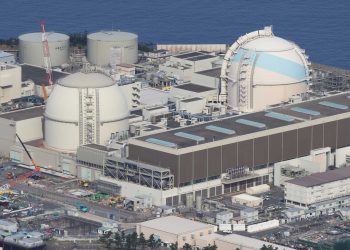,
India and Pakistan signed Wednesday a deal to reduce the risk of a nuclear arms accident in a show of cooperation and defiance against terror attacks that killed 68 people from both countries.
The New Delhi signing ceremony took place in public after Indian Foreign Minister Pranab Mukherjee and his Pakistani counterpart, Khurshid Kasuri, held an hour and 45 minutes of talks.
They repeatedly shook hands and smiled for photographers, pledging renewed commitment to their peace process.
“The holding of the joint commission meeting as scheduled is a reaffirmation of the commitment of both India and Pakistan to the dialogue process,” Mukherjee told reporters.
Kasuri agreed that, after the firebombing, the talks were “another sign of increasing cooperation between Pakistan and India.”
Both sides were examining “cooperation in education, information, IT and telecom, health, agriculture, tourism and science,” he said.
The train blasts “underlined the need of cooperation” in fighting terror, he added.
“You have also witnessed the signing this morning of the agreement between India and Pakistan on reducing the risk of accidents relating to nuclear weapons,” said Mukherjee.
The nuclear accord, which comes into force immediately, was the key confidence-building measure of Kasuri's visit that began Tuesday as part of efforts to resolve six decades of bloodshed over Kashmir.
No details were immediately available of how the agreement will work, but the two sides already exchange lists of nuclear facilities at the start of every year.
Islamabad and New Delhi first put forward the idea for a nuclear weapons safeguard agreement in 1999, but the bloody Kargil conflict intervened the same year and it took until January 2004 for peace talks to be relaunched.
The countries held tit-for-tat nuclear weapons tests in May 1998 that led to international sanctions on both and fears they would consider the weapons as bargaining chips in the dispute over Kashmir, which caused two of their three wars since independence in 1947.
The two sides also agreed to hold fresh talks on withdrawing troops from a strategic glacier in Kashmir that is billed as the world's highest battlefield.
“We have both agreed that the directors general of military operations will meet … we have suggested some dates,” Kasuri told reporters.
Wednesday's meeting — following the train blasts at midnight Sunday which killed mainly Muslims travelling home to Pakistan — had been scheduled to review the stop-go peace process.
It had been put on hold for four months after 186 people died in Mumbai train bombings last July.
Kasuri said he sought interaction between the railway authorities of both countries to ensure safety for tourists. India was studying proposals put forward by Pakistan to boost tourism, Mukherjee added.
The Indian minister ruled out a joint probe into the train blasts with Pakistan, but promised the “perpetrators of this heinous crime will be brought to book.
“Whatever information will be available … will be shared with the Pakistani authorities,” at a meeting of an India-Pakistan anti-terror panel starting March 6, he said.
Meanwhile, detectives investigating the train inferno probed links to a Pakistan-based militant outfit.
A recorded telephone call made shortly after the blasts pointed to Lashkar-e-Taiba, the main Islamic group fighting Indian rule in Kashmir, The Times of India said.
“Investigators … have picked up a vital terror trace — a phone call made to Pakistan-occupied Kashmir from Delhi after Sunday night's attack,” the daily said. “The recorded conversation reveals links to a Pakistan-based terrorist group.”
India blamed the same rebel group for an attack on its parliament in December 2001 which almost pushed the two neighbours to war.
However, Lashkar denied any role in a statement published Wednesday on the website of Greater Kashmir, a regional English-language daily.
Indian police are also questioning a Pakistani and have issued sketches of two other men suspected of links to the attacks.









